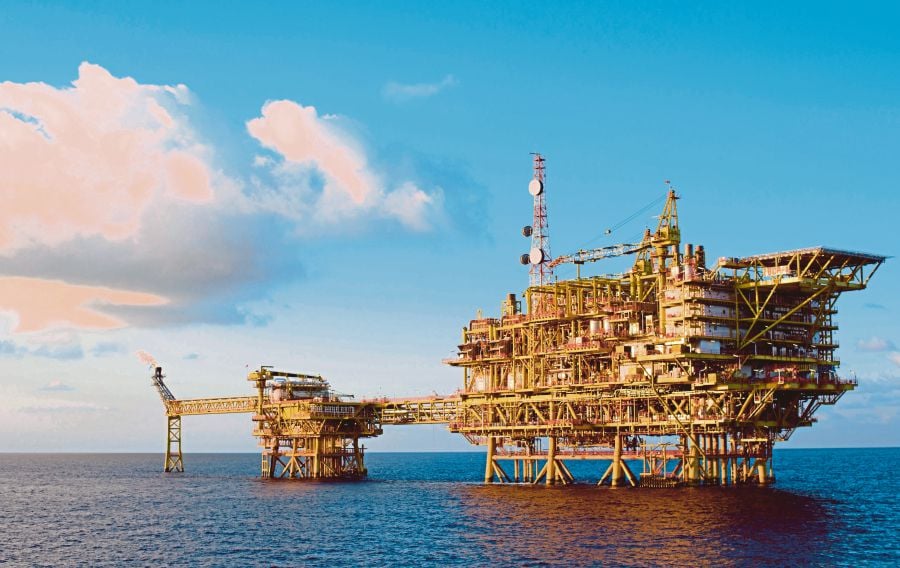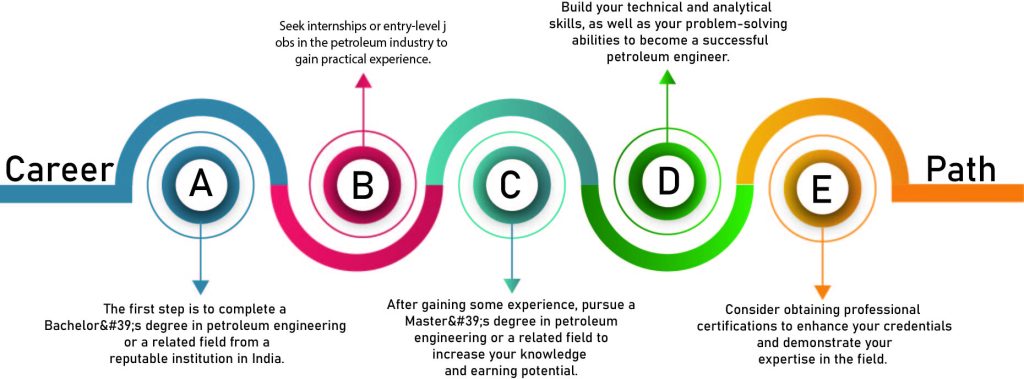Petroleum engineering is a branch of engineering that focuses on the exploration, extraction, and
production of oil and gas from underground reservoirs. It involves the use of scientific and technical
principles to design and develop drilling methods, equipment, and systems for the efficient and safe
extraction of oil and gas. Petroleum engineers work in the oil and gas industry, and their responsibilities
include evaluating geological data, designing drilling programs, overseeing drilling operations, and
developing strategies to maximize the recovery of oil and gas.

Work description
Petroleum engineers are responsible for designing and implementing methods to extract oil and gas
from underground reservoirs in the most efficient and cost-effective manner possible.
They evaluate geological data, plan and oversee drilling operations, design drilling programs, and
develop strategies to increase the recovery of oil and gas from existing reservoirs.
They also use their expertise to analyze and manage data related to production, reservoir performance,
and well completion.
Petroleum engineers work closely with geologists, production engineers, and other professionals in the
oil and gas industry to ensure that drilling operations are safe and environmentally responsible.
Additionally, they stay current with new technologies and techniques to continually improve the
efficiency and safety of oil and gas exploration and production.
High Demand
High demand for petroleum engineers in the oil and gas industry, providing a variety of job
opportunities.
Lucrative salaries
Competitive salaries and benefits packages.
Opportunities for innovation
Opportunities for international travel and work assignments.
Versatility
Opportunities for continuous learning and professional development.
Flexibility
Involvement in cutting-edge technologies and innovation.
Job satisfaction
Ability to contribute to the development of energy resources critical to modern society.
High stress
The oil and gas industry is subject to fluctuations in oil prices and economic conditions, leading
to potential job instability.
Long hours
Work can be physically and mentally demanding, requiring long hours and time away from
home.
Competitive field
Work can be located in remote or harsh environments, such as offshore platforms or desert
locations.
Constant learning
Environmental concerns related to the extraction and production of oil and gas can lead to
public scrutiny and negative perceptions of the industry.
Isolation
High levels of responsibility and pressure to make critical decisions related to safety and
production can be stressful.
Eye strain and other physical health issues
Limited career mobility outside of the oil and gas industry, as specialized skills may not be easily
transferable to other industries.
The cost of pursuing a career in petroleum engineering in India can vary depending on several factors,
such as the type of institution, level of education, and location. Here are some potential costs to
consider:
Tuition fees can vary widely depending on the type of institution and level of education. For example,
the average annual tuition fee for a bachelor's degree in petroleum engineering at an Indian Institute of
Technology (IIT) can range from INR 2-3 lakhs, while a master's degree at the same institution can cost
INR 50,000-1 lakh per semester.
Finally, for a Ph.D. in petroleum engineering, the cost may vary depending on the duration of the
program, research facilities, and living expenses. Typically, the cost may range from INR 5-20 lakhs per
year for a three to five-year program.
However, this cost can also be higher if you choose to pursue a degree from a top-tier institution or
study abroad. Additionally, other costs such as accommodation, textbooks, and other fees may also add
to the overall cost of education.
[wpcharts type=”horizontalbarchart” bgcolor=”red:gray:yellow,blue:gray:yellow,random:gray:yellow,purple:gray:yellow” min=”0″ legend=”true” titles=”2 year , 5 year” values=”3,7,5,12″]
The earning potential of a petroleum engineer depends on various factors such as the level of education,
experience, skills, and the employer's industry.
The average salary for a petroleum engineer in India is around INR 5-15 lakhs per annum, depending on
the factors mentioned above. Entry-level positions may start around INR 3-5 lakhs per annum, whereas
senior-level positions can earn upwards of INR 20 lakhs per annum or even higher.
Those with advanced degrees such as a Master's or Ph.D. in petroleum engineering or a related field
may have a higher earning potential.
Petroleum engineers with 1-4 years of experience can expect to earn an average salary of around INR 5-
10 lakhs per annum. However, those with more than ten years of experience can earn upwards of INR
15-20 lakhs per annum.
In summary, the earning potential of a petroleum engineer in India can range from INR 3-20 lakhs per
annum, depending on education, experience, skills, and employer industry.
[wpcharts type=”horizontalbarchart” bgcolor=”red:gray:yellow,blue:gray:yellow,random:gray:yellow,purple:gray:yellow” min=”0″ legend=”false” titles=”Entry-Level, Mid-Career, Senior-Level ” values=”5,15,25,35,45,55″]
Strong foundation in math and science, particularly in physics, chemistry, and calculus.
Strong problem-solving and analytical skills.
Excellent critical thinking abilities to evaluate complex data and make informed decisions.
Strong technical and technological knowledge.
Excellent communication and interpersonal skills to work effectively with teams and
stakeholders.
Ability to adapt to changing work environments and technologies.
Strong attention to detail and ability to work under pressure.
Lack of interest or passion for the petroleum industry and its related fields.
Weakness in foundational math and science subjects such as physics, chemistry, and calculus.
Poor critical thinking abilities and difficulty in evaluating complex data and making informed
decisions.
Poor communication and interpersonal skills that may hinder working effectively with teams
and stakeholders.
Inflexibility and unwillingness to continuously learn and stay up-to-date with the latest trends
and technologies in the industry.
Inability to adapt to changing work environments and technologies.
Lack of attention to detail and difficulty working under pressure.
Work-life balance
Work-life balance for petroleum engineers can vary depending on the company they work for and their
specific job responsibilities.
Some petroleum engineers work in the field for extended periods of time, while others work in an office
setting.
Field work can be physically demanding and require long hours, while office work may have more
regular hours. Petroleum engineers may work on projects that require them to be on call or work
overtime.
The industry may have periods of high demand or fluctuations in the market, which can affect the work-
life balance of petroleum engineers.
Some companies may offer flexible work arrangements, such as remote work or flexible schedules, to
help employees achieve a better work-life balance.
To maintain a good work-life balance, petroleum engineers may need to prioritize their time, set
boundaries, and communicate their needs with their employer and colleagues.

Petroleum engineering plays a major role in the global energy industry, and has a significant
impact on society and the environment.
The industry can provide employment opportunities and economic benefits to communities
where oil and gas operations are located.
The extraction and use of fossil fuels has been linked to environmental issues such as air and
water pollution, climate change, and habitat destruction.
Petroleum engineering can be a financially lucrative career, with high salaries and opportunities
for advancement.
The industry can provide opportunities for travel and work in different locations around the
world.
The work can be challenging and intellectually stimulating, and may involve solving complex
problems and working with advanced technology.
Artificial Intelligence Machine Learning
Drilling engineering: Focuses on designing and implementing drilling operations, including wellbore
construction, casing design, and drilling fluid management.
Cyber security
Reservoir engineering: Focuses on understanding the characteristics of oil and gas reservoirs, including
their size, shape, and fluid flow, in order to optimize production.
Software Engineering
Production engineering: Focuses on optimizing the production of oil and gas from reservoirs, including
developing and implementing production strategies, managing well performance, and addressing
production challenges.
Data Science Machine Learning
Well Completion and Stimulation: Focuses on the design and implementation of well completions,
including selecting and installing equipment such as tubing, casing, and production valves.
Computer Networks
Oil and Gas Facilities engineering: Focuses on the design and operation of surface facilities, including oil
and gas processing, transportation, and storage facilities.
Conclusion:
In conclusion, petroleum engineering can be a rewarding career path for those interested in the energy
industry, with opportunities for challenging work, high salaries, and global travel. However, the industry
also has significant social and environmental impacts, and individuals considering a career in petroleum
engineering should carefully weigh the potential benefits and drawbacks before pursuing this path.



